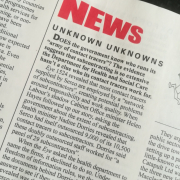NHS Insourcing Contracts – Conflict of Interest alert..
Imagine you are a Head of Procurement. Workload is growing and you are suffering from staff shortages. Your team can’t keep up. So you go to your boss with a proposition. You and a handful of the team are prepared to work a few evenings in order to catch up with the work. But the firm will pay your own limited company, Procurement Excellence Ltd, on an outsourced service basis. Maybe £100K’s worth or work should help get up to date.
It would be interesting to see the reaction of the firm, but I suspect the Head of Procurement might not be in their post for long after that. However, a parallel situation in the UK’s health service has led to hospitals contracting with their own medical staff in exactly that manner. And that cannot be acceptable.
A report in the Observer over the weekend revealed that UK NHS health Trusts are paying businesses owned by their own doctors to perform services, often using the Trust’s own facilities.
“At Manchester University NHS Foundation Trust, three top surgeons including a clinical lead and a former clinical director are the owners of Fortify Clinic , a company offering “end to end” services to tackle waiting lists. The firm was paid £1.3m by the trust for work in 2022.”
In another case, a Sheffield firm owned by three consultants (doctors) was sold to a private health provider for £13 million after winning a number of these “insourcing” contracts. Trusts are facing long patient waiting lists and declining standards of care and public health in the UK following Covid. Strikes by nurses and ambulance staff don’t help either. So these private firms carry out operations “out of hours”, in the evenings and weekends, often using the Trusts’ own facilities and sometimes even some of their own staff. But the firms are paid as external suppliers.
One driver of this is the pension situation for high-earning individuals, including many doctors. The “lifetime cap” on pension pots means that a doctor might face a crazy marginal tax rate if they earn “too much” and their pension contributions breach the limit. But if the money flows into a business, it can be managed in a more tax-efficient manner, presumably.
Although the pension situation is pretty stupid, it does apply to everyone, not just doctors. The government should address it – but doing do just for medics would rightly bring cries of “unfair” from others in a similar situation. But the tax position is no excuse for hospitals agreeing to this approach, which is fraught with problems.
The conflicts of interest are obvious and significant. Trusts are awarding contracts – without competitive process, I suspect – to their own “friends”. The decision-making “buyers” are almost certainly close to those benefitting from the contracts. There are also conflicts for the medics involved. There may be less incentive for instance to work harder, more efficiently or rapidly if you know you will get a substantial contract and more income if the backlog of work grows rather than shrinks. And are the hospitals charging these firms for the use of their facilities? They should be, otherwise external private healthcare providers could cry “foul” for unfair procurement.
I worked in a factory one holiday when I was a student, making insulation for pipes (I’m pretty sure it was asbestos, but that is another story…) Work pretty much stopped after lunch on many Friday afternoons, just to make sure there was overtime for those who wanted it on Saturday. I’m not suggesting a surgeon would do the same quite as overtly, but even if they resist the temptation, a conflict of interest has been created.
It is also just another step towards the privatisation of the NHS. What is interesting is that this is not being driven by some secret political strategy. It is being driven by incompetent political management, resulting by staff within the NHS taking action in their own interest (and sometimes that of the patient too) that is leading to a de facto two-tier health service. It has already happened in dental services; now we are seeing it more widely, as more and more people who can afford it “go private”.
If you see a consultant (doctor), and they tell you that the waiting list within the NHS is 6 months, but they could do it for you privately next week, in the same hospital, using the same excellent facilities, for a few thousand pounds, what do you say? But if the doctor’s firm is making large amounts of money out of this, can they really offer unbiased advice – “Doctor, will my condition get worse if I wait six months for NHS treatment”? What are they going to say?
Finally, are procurement teams involved with this at all? I’d like to think some might have pointed out the st issues. If not, perhaps they should start now.










Leave a Reply
Want to join the discussion?Feel free to contribute!